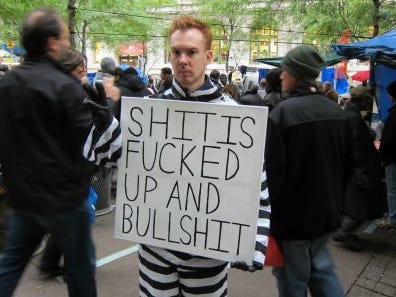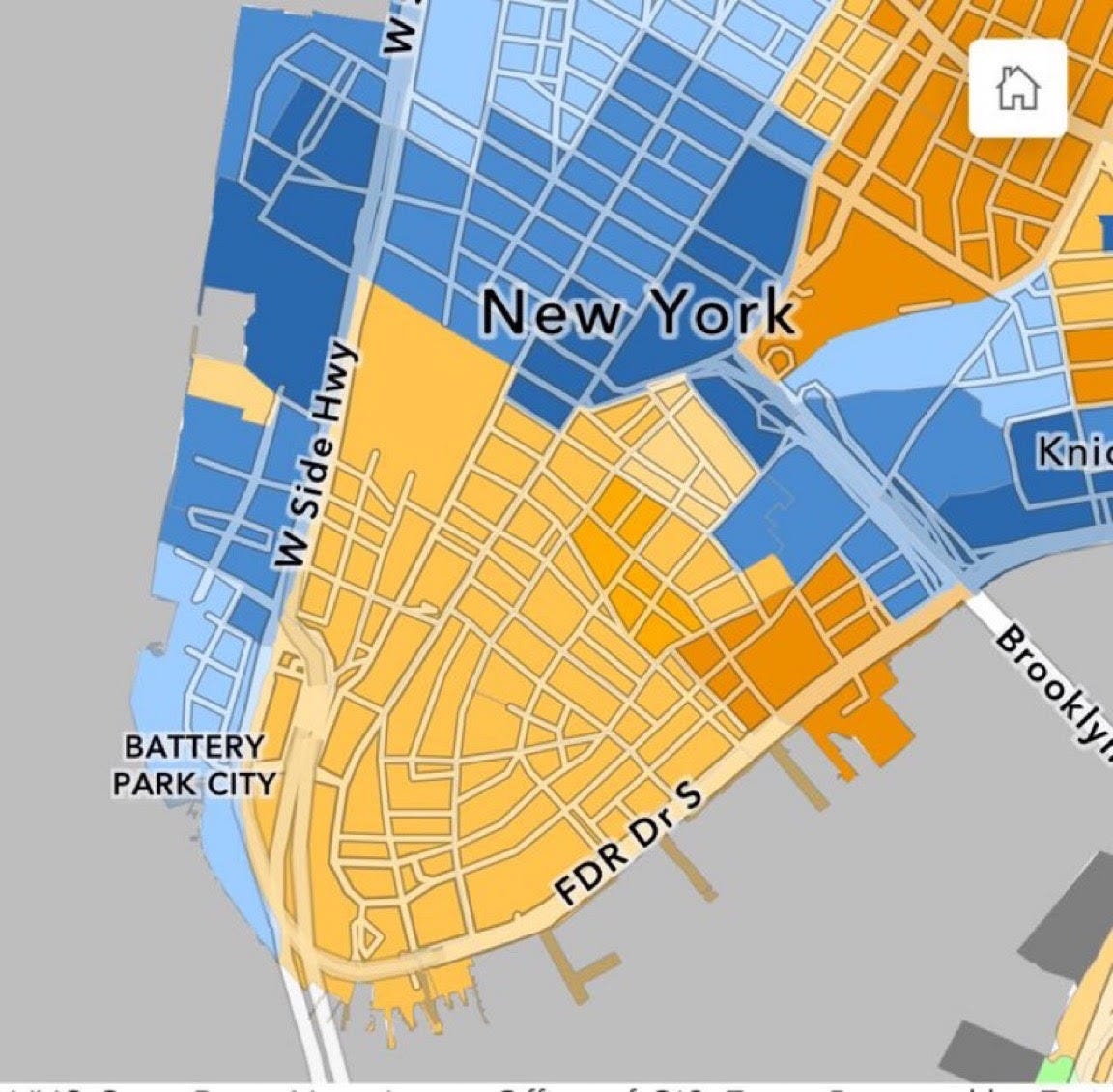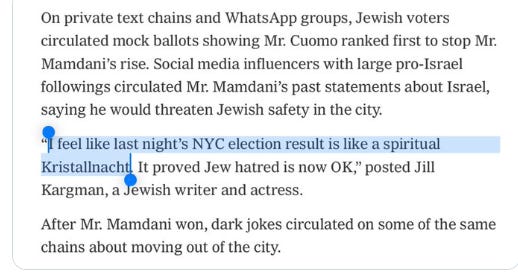Welcome to Zohran Mamdani Economic Derangement Syndrome
Good things can happen? I'm hearing this for the first time. Plus: Why Democrats don't understand money, don't trust Polymarket, and why Wall Street and the "commie corridor" both voted socialist
Hi. There’s a lot to say about Zohran Mamdani’s primary election win, so here’s what you will find here:
Why national Democrats don’t understand money the way voters do
The rise of Mamdani Economic Derangement Syndrome, i.e, rich people spiraling
Why we know Mamdani’s economic policy proposals work: Because they have worked elsewhere
What does the use of money in elections tell us? Think small. No, smaller.
Why are Wall Street bros and the “Commie Corridor” of Western Queens and Brownstone Brooklyn united in voting overwhelmingly for a Democratic socialist?
Now let’s get into it.
Zohran Mamdani, a 33-year-old Democratic Socialist who grew up in New York City, won the Democratic primary for the city’s mayoral election, trouncing former governor Andrew Cuomo, a widely loathed figure in the city for many years for treating the city’s transportation budget like a piggy bank for his donors. (Arguably, the only thing Cuomo has ever done to help the city’s economy is pay his canvassers $25 an hour.)
Cue Zohran Mamdani Economic Derangement Syndrome, like the sarcastic “Trump Derangement Syndrome” name that Republicans coined for liberal Democrats who despise Trump. It’s a phenomenon in which very rich people are spiraling at the thought of a livable city and an equitable society and perhaps even having to contribute even a fraction of their money in taxes. It’s quite a coalition of panic: Billionaires, right-wingers, liberals. Yelling together about the risk of “socialism,” even though Mamdani’s policies are completely standard within some very capitalistic economic systems including our very own. For hours and hours after Mamdani’s win, social media hosted a howling void of narcissistic right-wing ego death as the worst people in the country grieve the idea of an economically sustainable life for anyone other than themselves. Screaming, crying, throwing up, comparing a New York City with free buses to a fascist 1930s racial extermination program, plotting to undermine a democratic primary.
Billionaires leaving New York City? Let us know how it works out
Ackman previously threatened that billionaires would leave New York City if Mamdani won. The standard joke response was “good riddance,” but I’d also add: Good luck with that. A threat like that is empty. New York City has been the center of business and finance in the United States for over 250 years — before there was even a United States. New York’s enormous economic power even in colonial times was the reason that the city was not made the capital of the United States, because the Founders didn’t want to concentrate politics and money in one place.
A few peevish billionaires — who don’t pay their taxes, by the way — can leave and nothing will change. In fact, it may free up some prime real estate to be divvied up among other New York residents. And a lot of the billionaires that live “in New York” don’t actually live in the city itself, but in its suburbs, which renders their opinions moot. Besides, where would they go? All the big meetings still happen in New York, the action is here, the boards of New York City cultural institutions are still the most coveted social status signifier among the rich. They’re not going to find that in Peoria. So, please, by all means, they should leave. It makes it that much more entertaining when they have to come back.
Nonstop Mamdani
Despite the comical overreaction to Mamdani’s win among petulant billionaires, Mamdani isn’t the first Democratic Socialist to be on the path to New York’s coveted mayoralty (David Dinkins was the first; Jacobin examined his record). Mamdani achieved this mainly because his endless affability (and winning dimple) was the ideal delivery system for his policy proposals. Someone on Twitter dug up an old article that revealed that Mamdani’s mom had several nicknames for him, including Nonstop Mamdani.
Yet while Mamdani is overwhelmingly likable, charismatic and handsome, those are all secondary aspects to why he won: Policy.
Specifically, economic policy that promised some relief for city residents struggling for years, completely unheard, under the enormous burdens of stratospheric rents, expensive grocery prices, and unaffordable childcare. Mamdani was persistent in bringing every conversation back to policy. Even when asked about the waves of reprehensible Islamophobia directed at him, he quickly steered the conversation back to affordability.
His dogged focus on economic conditions is why you can’t talk about Mamdani’s win without talking about money. While most pundits obsessed about a “clash of civilizations” type narrative about the ideological conflict between socialism and capitalism, this primary was less about inflated ideas on an intellectual battlefield and more about what cold, hard cash does to people’s lives.
Or, in the words of the campaign advice that propelled Bill Clinton into his first term as president: It’s the economy, stupid.
Money ruled this primary race. Outrageous campaign donations, debates over specific economic plans, billionaires trying to buy their way into politics, middle-class New Yorkers confronted with halal-cart inflation because of sloppy city permitting, and the sheer overbearing feudal entitlement of what we used to call, during the days of Occupy Wall Street, “the 1%.”

The credit for this financial laser-focus on money first, last and throughout goes to Mamdani and his team, who refused to play into the usual Democratic Party strategy of shallow memes, empty slogans and gassy culture-war rhetoric.
Team Mamdani was instead relentless in centering tangible, relatable “kitchen-table issues” like the price of groceries, the rise in rents, and the cost of childcare. Then they knocked on 1.5 million doors to talk about it.
That was a winning technique, and a winning message, in a time when inflation and high consumer debt, along with stratospheric housing costs, are crushing life in New York for everyone — even the 1%.
Mamdani touted policies that have been already tested
Nearly all of Mamdani’s enemies derided his policy proposals as unworkable, but in the immortal words of Dakota Johnson, that’s simply not true, Ellen. As a native New Yorker, I was rooting for Mamdani specifically because I recognized that his economic policies had worked before both in the city and the world — mainly rent freezes, of which we had three under previous mayor Bill De Blasio, universal childcare for kids 6 months to 5 years old, which already exists in France, the Scandinavian countries and other European states, and free buses, which exist in too many places to count.
Mamdani also promised a city-run grocery store, like the ones in St. Paul and Atlanta. The stores, which would sell food at wholesale prices and do a lot to reduce food insecurity in the city, was called impractical by his enemies even though it’s not only practical, but standard within the US government system, including at military bases and state-owned liquor stores nationally, per Food Tank:
Myers and Caruso’s research shows that government-owned grocery stores are possible and the blueprints for public-owned models currently exist, including commissaries on military bases and state-owned liquor stores.
Caruso adds that “the government already does have a lot of infrastructure in place to purchase and distribute food, they do it all the time.” She notes that the Department of Defense “is still one of the largest food vendors in the country.”
The grocery store idea is one I love because I’m sick of paying $4 for a pound of pears and $2 for four little lemons. Grocery-price inflation in New York City has become excruciating, and obviously not just for the working class; it’s affecting the middle class and the upper middle class too.
New Yorkers of all political ideologies have noticed they have to allocate more money just to stay alive, and they desperately want Mamdani’s idea, per the Climate and Community Institute:
New polling shows that 85% of New Yorkers are paying more for groceries and food now compared to last year and 91% of New Yorkers are concerned about how inflation impacts how much they pay to get food on the table.
Two-thirds of New Yorkers polled (66%) support the creation of municipal grocery stores in New York City, including a strong majority of Democrats (72%), as well as a majority of Independents (64%) and Republicans (54%).
The idea is even less difficult because it simply reroutes subsidies that the city already gives to grocery kingpins like John Catsimatidis, who built a $4 billion fortune by gouging buyers at his notoriously overpriced Gristedes chain. Catsimatidis has been so chintzy with his fortune that Forbes rated him a 1 — the lowest score, meaning he has given away less than 1% of his enormous wealth to help other people — in its philanthropy index.
Catsimatidis’s opposition to Mamdani was that a low-priced grocery option for New Yorkers would endanger his own profits from hiking prices on basic foodstuffs. Well, yeah. That’s kind of the point.
You can read more about Mamdani’s grocery plan in this great post from
:Since 2009, the city has given tax breaks and subsidies totaling $100 million to private grocery stores in food deserts and impoverished neighborhoods through its Food Retail Expansion Program to Support Health program (FRESH).4 As the above text mentions, these stores are not required to take welfare, undercutting their supposed purpose to help low-income families. A 2015 study found no conclusive evidence that these subsidies improved food availability, so clearly, there’s room for improvement.
The rent is too damn high
Many people were surprised that well-heeled urban professionals in upscale districts were voting for Mamdani, but it makes sense if you take note that the median rent in the city is over $4,000. Who’s going to be paying that? The people who have $4000 a month to spend, obviously.
Rent in New York City has risen beyond what most people can afford — even for the finance bros in $5000-a-month apartments in the Financial District.
RentHop found that the median rent for a New York City apartment is currently $4,400, 3.5% higher than this time last year.
At the same time, not only is the city more expensive to rent in, but more of the city is more expensive.
According to RentHop, rental prices increased at 94% of the neighborhoods around New York’s subway stations in 2023, and increased again at 84% of the neighborhoods around subway stations in 2024.
The extortionate rents in New York City easily explain why both the Financial District, which houses investment bankers and lawyers, and the “Commie Corridor” of progressive upscale professionals in Brooklyn and Queens both came out for Mamdani despite what you would think are competing ideologies.
High rent unites them.
Compare a map of the highest rents in New York City with the maps of Mamdani’s best districts:

In the words of mayoral candidate Jimmy McMillan from a few elections back, the rent is too damn high. And Mamdani’s practical promise to freeze rents gave New Yorkers hope, especially since the concept had already been proven by three previous rent freezes during the height of the pandemic from then-mayor Bill de Blasio.
Money in politics is like water: It has to be moved, not stored
Money was also weaponized by Andrew Cuomo, a 67-year-old sex pest and dangerous driver who was universally loathed within the city yet still collected $35 million in support mostly from corrupt billionaires, landlords and a variety of racist Islamophobes, including $25 million from the single largest PAC in New York City mayoral election history.
Cuomo had a juggernaut at his disposal, and he blew it. I believe this is because Cuomo, like many Democrats before him and around him, doesn’t understand how money works.










